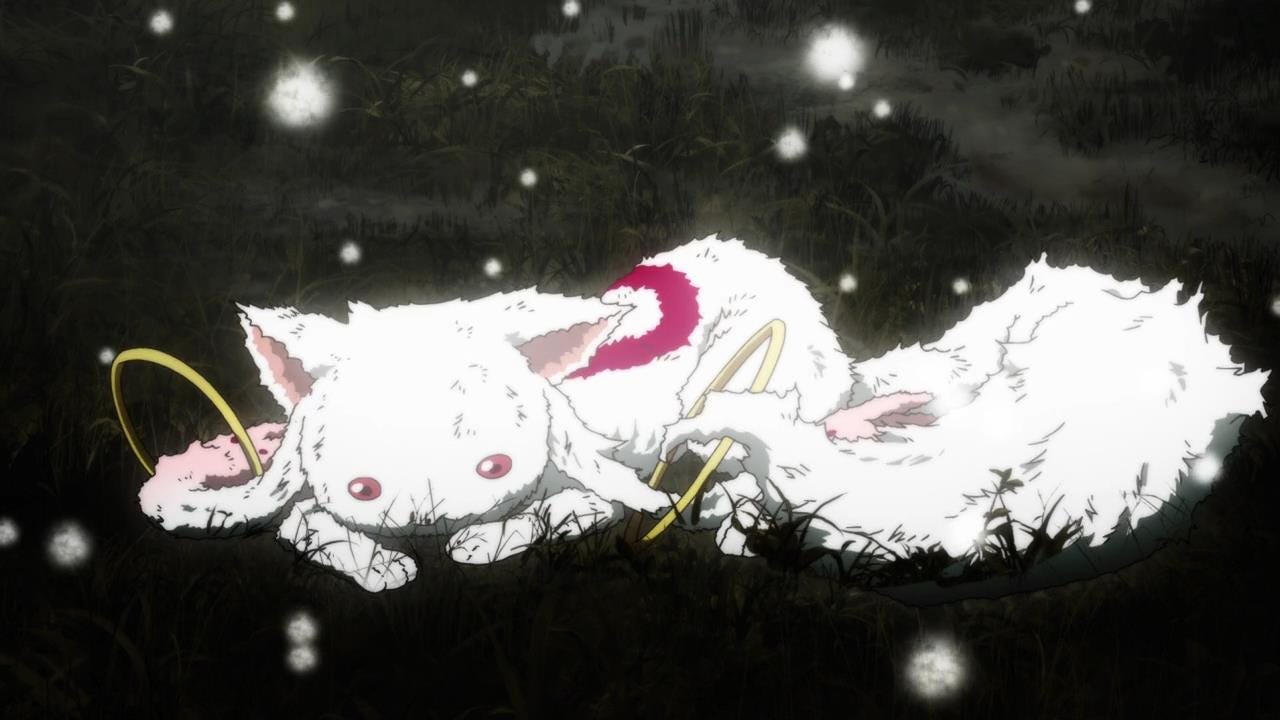The World is a Morality Play
Madoka Magica, Rand, and the Longhouse
Madoka Magica is my favorite Shakespearean tragedy.
The 2000s anime focuses all the stakes of the world onto the personal will of the characters. By the entropic logic of its universe, this will and the magical powers that come with it is what keeps everyone alive. It is a modern literary tragedy and for that, it is beautiful.
I believe personal stakes are greatly underrated and undersupplied in the modern day. To our detriment, the medium of our age is escalating speculation about The Most Important Thing, placing ever-escalating apocalyptic thrillers over a serious exploration of human nature.
The Madoka Magica formula is very simple. Each character has a fundamental desire. This leads them to make a contract with the magical cat Kyubey to become a magical girl, getting their wish equal to their magical power. Getting their wish unwinds them, to the point where they die, or better yet become corrupted monsters called witches.
The moral logic of Madoka Magica is that you will either recognize the limits of your desires, or destroy yourself in the process. Despite being a straightforward and formulaic anime, I can't help but find myself lost in thought after rewatching each arc. These desires are ordinary; they appear around us and within us every day. Desires such as survival, respect, love, or independence are perfectly normal — and in most cases don’t lead to ruin. Why is that?
I proclaimed that the core thesis of Oyasumi Punpun is that there is no suffering as great as having a childish fantasy fulfilled. Madoka presents a broader version of this tragic pattern. Kyubey, the magical cat, is wish fulfillment. In the show, it literally grants wishes. The tragedy of Madoka Magica is that this wish fulfillment inevitably ends with the girls worse off.
The Randian Reading: Sayaka and Kyouko
Magical girls are given the power to rival the world. If you had that power, would you put the approval of others over your own desires?
Sayaka and Kyouko are fundamentally dishonest with themselves. They make dishonest wishes. They are not willing to claim what they want, which is the will and adoration of others. Maybe this is because such things cannot be taken. Maybe it is because they are cowards.
The Suffering Machine
So why does Kyubey grant wishes? Long story short, the release of intense emotion powers the universe.
Kyubey is an alien trying to prevent the inevitable heat death of the universe. His species found that humans are uniquely emotional, teenage girls are exceptional among humans, and the few girls chosen to become magical girls are the most expressive of all. The conflict and suffering from chasing their wishes and their fates is turned into energy to keep the universe going.
Kyubey is the ultimate effective altruist, accepting that a cycle of conflict and suffering is nothing compared to the collapse of a vast multispecies universe.
The eponymous Madoka Kaname is a macguffin of sorts, a girl with an immense power who Homura and Kyubey fight over. Kyubey wants Madoka to become a magical girl and release her extraordinary power. Homura wants to preserve Madoka’s innocence, as much for her own sake as for Madoka.
“Literature is driven by conflict” says Henry Oliver on my podcast. He’s right. Literature is the suffering machine. You’re the reason Kyubey does what he does, as much as the heat death of the universe. By the way, this post is literature. Twitter is literature. Podcasts are literature. Culture Warriors Deserve Our Utmost Respect.
Respecting Homura Morality
Magical girls are given the power to rival the world. If you had that power, would you wish for what you truly desire?
Homura says yes, which is why I respect Homura morality. Everyone else, even Kyubey, justifies themselves by invoking the good of others. Kyubey pretends to be amoral, but is ultimately part of the same metaphysics of compromise and utility as the magical girls. Homura does too, at first. But by the end, she understands. She understands herself and she understands the game that all the magical girls are playing.
Homura is the true Randian, but Homura is also the one who fulfills the meaning of Madoka Magica.
At the end of the main series, Madoka gets her wish: magical girls die normally instead of turning into witches. She breaks the Shakespearean cycle. I always thought this ending was lame, and I recently discovered I wasn’t alone. What ending is satisfying? Well …
After Homura gets her wish in the sequel movie and becomes the god of a new universe, she spends her spare time beating Kyubey to death over and over again. RETRIBUTION! Of the two endings, this is definitely the more satisfying to me. But why?



